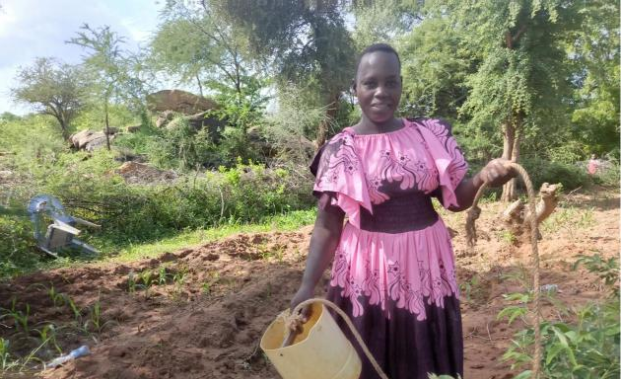

In Tharaka Nithi county, where harsh weather conditions once made farming nearly impossible, a silent revolution is taking place.
Smallholder farmers, with support from local groups such as the Tharaka Children & Women Welfare Programme, are embracing climate-smart agriculture and boosting yields, conserving resources and building resilience in the face of climate change.
Helen Gakii, a farmer from Kaukuro village grows a variety of crops and thanks to the water pan on her farm, she now enjoys three harvests a year.
“The water pan that i received from TCWWP has helped me grow crops throughout the year despite the dry conditions," she says.
The organisation also trained Gakii on composting, which has helped her enhance her farm's productivity.
“I grow different types of crops, including pigeon peas, maize, cowpeas and green grams. My farm has seen significant improvement,” she says. In addition to crop farming, Gakii is also growing mangoes and oranges for sale.
Julia Kamene, from Kamatungu village and a member of the Kamatungu Mothers Group in Tharaka South grows and sells tree seedlings. The proceeds help her pay for school fees and support her family.
"I also grow maize using conservation agriculture and the yields have been much better than when I was using conventional methods,” she says.
Kamene grows fruits and medicinal trees. Her nursery includes bamboo, neem trees and fruit trees such as tamarind and grafted mangoes. Seedling prices range from Sh30 to Sh100, depending on the tree type and its benefits.
The farmer says the trainings she received from Pelum have helped her invest in a healthier and chemical-free future.
Eric Buteti, a project manager at the Tharaka Children & Women Welfare Programme says his organisation has become a beacon of hope for farmers in the region.
“We empower them with techniques that enable them to farm in these arid areas,” he says.
Buteti says through adopting innovative practices such as agro-ecology, water conservation and use of indigenous knowledge to combat the harsh weather conditions, farmers enjoy three harvests a year.
“By utilising water pans, compost and farmyard manure, farmers are able to grow a wide variety of crops including pigeon peas, maize, cowpeas and green grams, all on a small piece of land. The success isn’t just about increasing the yields, it’s about strengthening food security for their families and the broader community,” he says.
Buteti says they work closely with farmers in different parts of Tharaka, guiding them on different techniques that enable farming in dryland areas, with support from Pelum.
“We also expose farmers to various exhibitions and trainings, helping reduce the knowledge gap in the community. We encourage them to embrace indigenous crops, as they are better adapted to this region and require fewer inputs compared to other crops," he says.
As a result, many farmers have adopted agro-ecological methods, shifting away from conventional farming, which often has harmful effects.
“We’ve also introduced water pans to help farmers improve their production. This has ensured some farmers, despite the dry conditions, are still able to thrive,” Buteti says.
“Our farmers are eager to adopt these technologies and through TCWWP, we’re grateful for the ongoing partnerships and would like to see more support to help these small-scale farmers,” he says.












